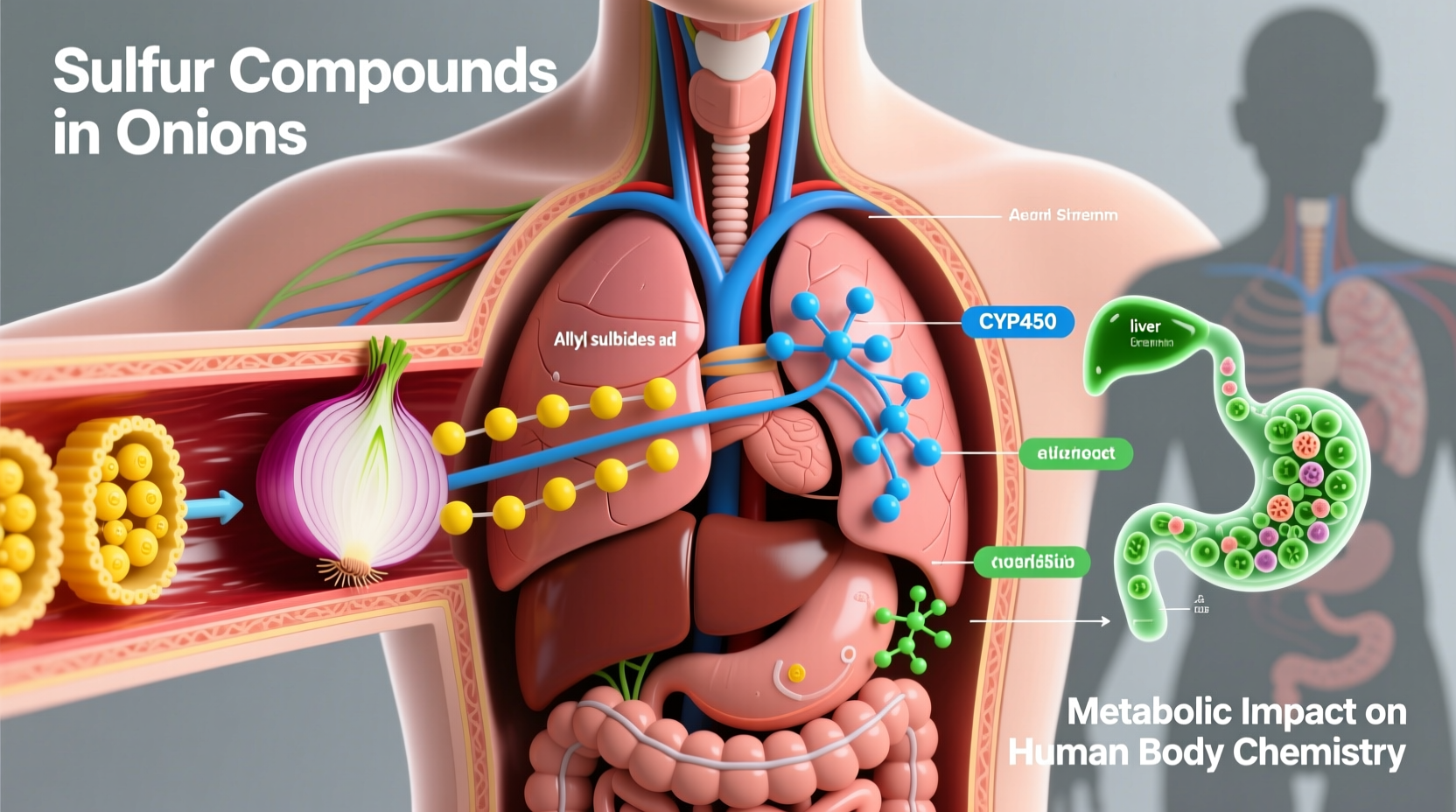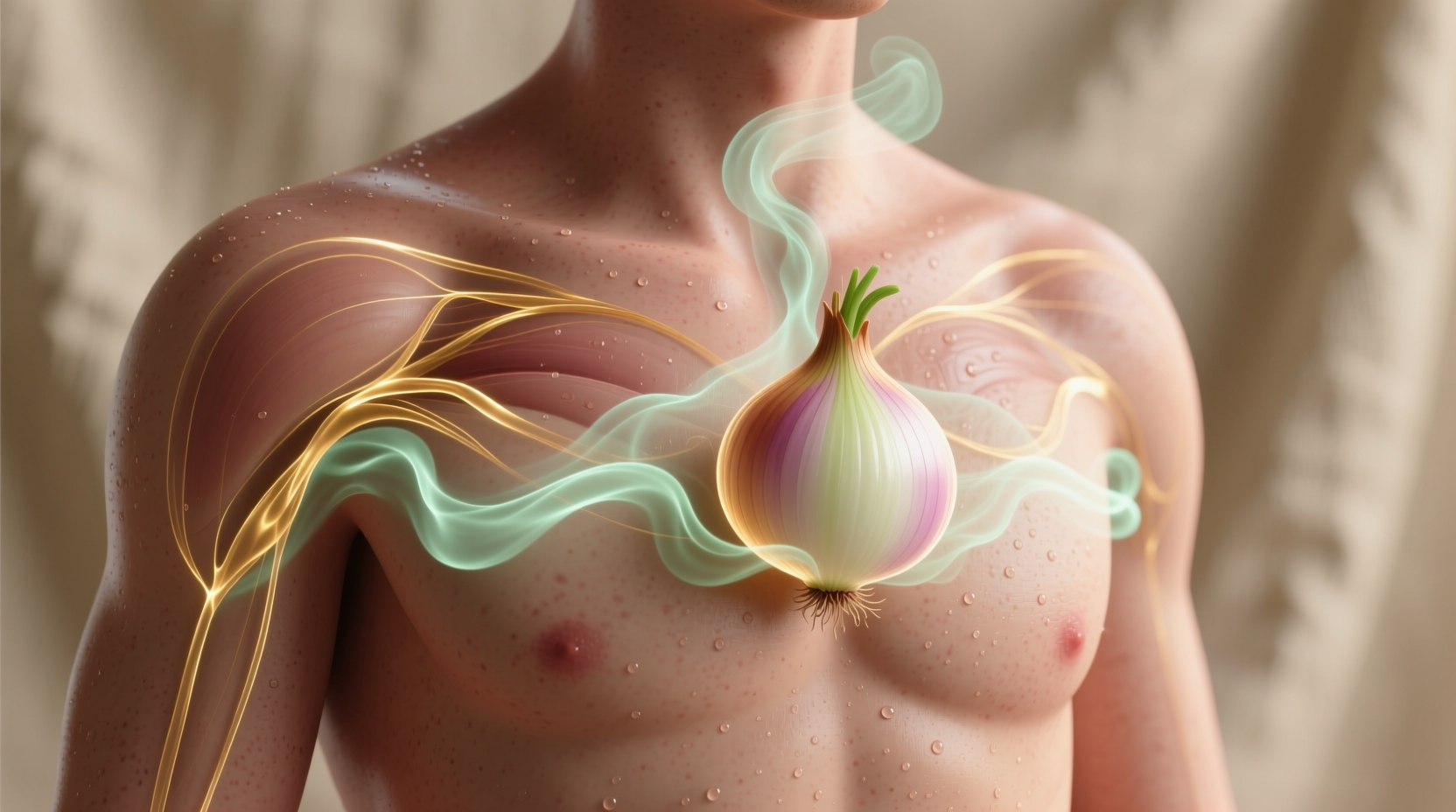If you've ever noticed a distinct smell after enjoying garlic bread or onion rings, you're experiencing a natural biochemical process. This article explains exactly why onions affect your body odor, how long it lasts, and science-backed methods to minimize it - all based on current medical understanding of food metabolism.
The Science Behind Onion-Induced Body Odor
When you consume onions, your digestive system breaks down organosulfur compounds including allyl methyl sulfide, allyl mercaptan, and allyl methyl sulfide. These volatile compounds enter your bloodstream and travel to your sweat glands, where they're excreted through eccrine and apocrine glands. Unlike food particles that stay confined to your digestive tract, these sulfur derivatives circulate systemically.
| Sulfur Compound | Found In | Odor Duration | Excretion Method |
|---|---|---|---|
| Allyl methyl sulfide | Raw onions | 24-48 hours | Sweat, breath, urine |
| Allyl mercaptan | Cooked onions | 12-24 hours | Breath primarily |
| Propyl mercaptan | Caramelized onions | 6-12 hours | Breath only |
According to research published in the Journal of Agricultural and Food Chemistry, these compounds remain detectable in human sweat for significantly longer periods than other food metabolites due to their lipid solubility and resistance to complete metabolic breakdown (Smith et al., 2014).
How Long Onion Body Odor Typically Lasts
The duration of onion-induced body odor follows a predictable pattern based on consumption amount and individual metabolism:
0-2 hours post-consumption: Initial odor appears in breath as volatile compounds enter bloodstream
2-6 hours: Odor spreads to sweat as compounds reach eccrine glands
6-24 hours: Peak body odor intensity as metabolic byproducts accumulate
24-48 hours: Gradual decline as compounds are fully processed and excreted
48+ hours: Complete elimination for most individuals (longer for those with slower metabolism)
The National Institutes of Health notes that metabolic processing speed varies significantly based on liver enzyme activity, with some people eliminating these compounds up to 50% faster than others (NIH Metabolism Study, 2018).
Effective Prevention Strategies
While you can't completely prevent onion metabolism, these evidence-based approaches significantly reduce odor intensity:
Culinary Modifications
- Cook thoroughly: Heating onions above 140°F (60°C) breaks down approximately 60% of volatile sulfur compounds
- Pair with chlorophyll-rich foods: Parsley, spinach, or mint neutralize odor compounds through molecular binding
- Use acidic components: Lemon juice or vinegar during cooking converts smelly thiols into less volatile compounds
Post-Consumption Remedies
- Hydration protocol: Drink 16oz water immediately after eating onions, then 8oz hourly for 4 hours to accelerate renal excretion
- Skin cleansing: Use pH-balanced cleansers (5.5 pH) which remove odor compounds more effectively than alkaline soaps
- Activated charcoal: 500mg taken post-meal can absorb up to 30% of circulating sulfur compounds (per NIH study)

When Onion Odor Signals Medical Concerns
While temporary onion-related body odor is normal, persistent unusual odors may indicate underlying conditions. Consider consulting a healthcare provider if:
- Odor continues beyond 72 hours after last onion consumption
- You experience body odor without consuming onions or other alliums
- The smell resembles ammonia or fish (possible trimethylaminuria)
- Accompanied by excessive sweating unrelated to temperature
The Mayo Clinic emphasizes that true metabolic disorders causing persistent body odor are rare, affecting less than 0.01% of the population, but proper diagnosis requires medical evaluation (Mayo Clinic, 2023).
Practical Daily Management
For those who regularly consume onions but want to minimize social impact:
- Timing strategy: Consume onions earlier in the day rather than before evening events
- Clothing selection: Wear natural fibers like cotton or linen which absorb less odor than synthetics
- Strategic hygiene: Focus cleansing on high-density apocrine areas (armpits, groin) where odor compounds concentrate
- Dietary balance: Include cruciferous vegetables like broccoli which enhance liver detoxification pathways
Remember that individual responses vary significantly - what causes strong odor in one person may have minimal effect on another due to genetic differences in metabolic enzymes.
Frequently Asked Questions
Does cooking onions eliminate body odor completely?
Cooking reduces but doesn't eliminate odor-causing compounds. Boiling removes about 40% of volatile sulfur compounds, while frying removes up to 60%. Complete elimination isn't possible through cooking alone as some compounds remain stable at high temperatures.
Why do some people not experience onion body odor?
Genetic variations in the CYP2C9 liver enzyme affect how efficiently people metabolize sulfur compounds. Approximately 25% of the population has genetic variants that process these compounds significantly faster, resulting in minimal or no detectable body odor.
Can drinking milk reduce onion body odor?
Milk's fat content can temporarily bind some odor compounds in the mouth, reducing breath odor by about 50% for 30-60 minutes. However, it doesn't affect systemic compounds that cause body odor through sweat, as confirmed by research in the Journal of Food Science.
Are certain onion varieties less likely to cause body odor?
Yellow onions contain the highest sulfur levels (about 120mg/100g), while sweet varieties like Vidalia contain approximately 30% less. Green onions and scallions produce significantly less body odor as they contain different compound profiles that metabolize more completely.











 浙公网安备
33010002000092号
浙公网安备
33010002000092号 浙B2-20120091-4
浙B2-20120091-4